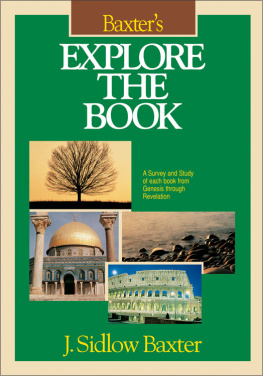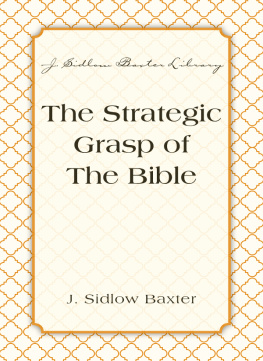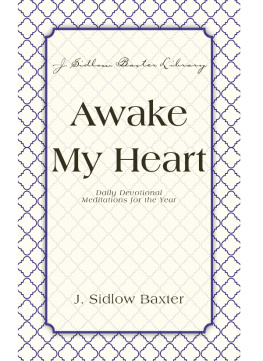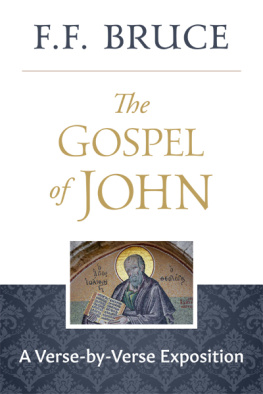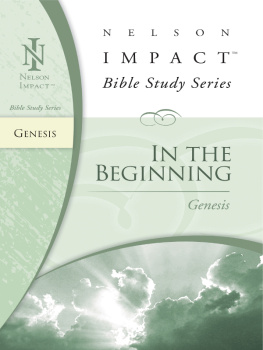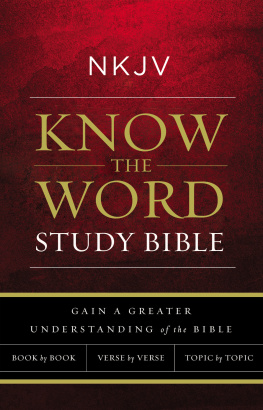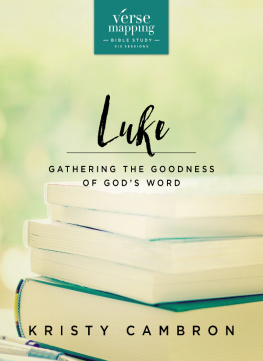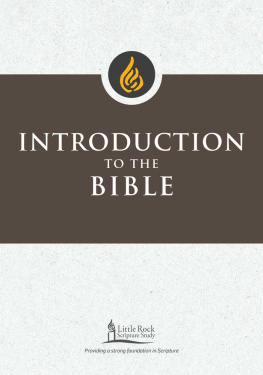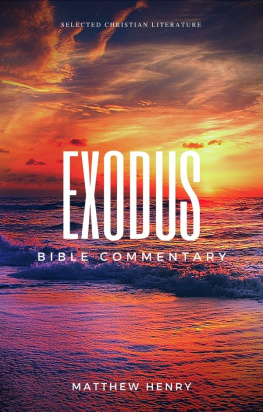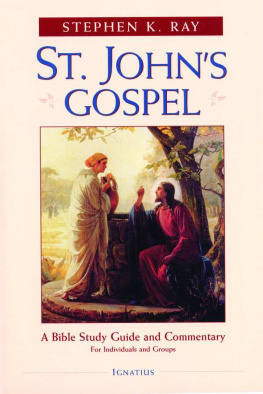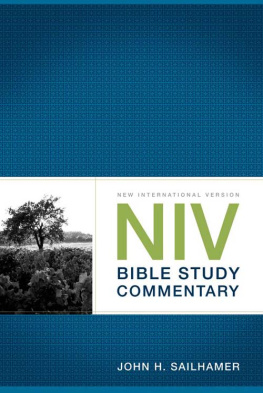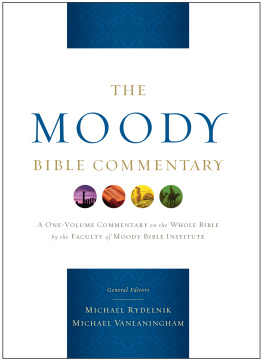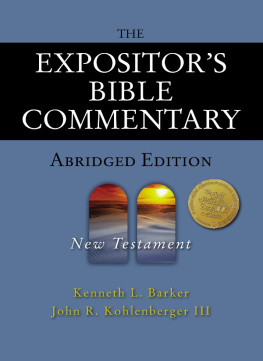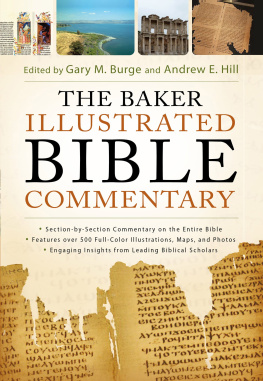These studies are dedicated with deep gratitude and affectionate esteem to my beloved, saintly, and now elderly friend,
JAMES ARTHUR YOXALL, ESQ., of Ashton-under-Lyne and Stalybridge;
my spiritual father and gifted teacher in the precious things of Christ; the inspirer of many heavenward aspirings within me, the one who first planted in my youthful heart a zest for Bible study; who has always been to me the ideal Christian gentleman, the choicest of preachers, and, above all, a kindly, experienced older friend ever brimming over with the sanctifying love of the Lord Jesus.
THE BULK of the instalments which comprise this Bible Course were originally delivered as my Thursday evening Bible Lectures in Charlotte Chapel, Edinburgh. That accounts for their conversational mode of address in parts. They were not written as essays, but were designed for public utterance, and I have thought it wise to leave them in their first form, believing that there are certain practical advantages in so doing. I would ask that this be noted leniently, especially if the exacting eyes of some literary connoisseur or dilettante should wander over them in their now-printed fixity. Moreover, I must plead that as these studies were first prepared to be spoken, without thought of later publication, I have in various parts indulged a preachers rather than a writers liberty in appropriating from the writings of others. I can only hope that sheer admiration may not have betrayed me too near the dreaded boundary-line of plagiarism. If it has, then I am relieved to feel certain that it can only be with authors who are no longer with us. I can never be too grateful to dear old (and, to many, old-fashioned) John Kitto, and to John Urquhart and A. T. Pierson, and Sir Robert Anderson, and G. Campbell Morgan, and others of the same evangelical tradition. They were all masters in their own day and in their own way. To them all, and to that incomparable composite work, the Pulpit Commentary, I here acknowledge my repeated indebtedness, and pay my tribute to them all. This Bible Course as a whole, however, is solidly the product of my own independent study, and I gladly accept responsibility for it, believing that in every part it genuinely honours the Bible as the inspired Word of God. May God graciously crown it with a ministry of usefulness to many who live and labour for His dear Son, our Lord and Saviour.
J. S. B.
Within this wondrous volume lies The mystery of mysteries; Happiest they of human race To whom their God has given grace To read, to fear, to hope, to pray, To lift the latch, to find the way; And better had they neer been born Who read to doubt, or read to scorn.
SIR WALTER SCOTT.
No MANS education is complete if he does not know the Bible No Christian minister is really qualified for the ministry of the Christian Church without a thorough study of the Bible. No Christian worker can be fully effective without a ready knowledge of the Bible. No Christian believer can live the Christian life to the full without an adequate grasp of the Bible.
Our Purpose
Our purpose in this present course of Bible study is to give a grounding in the Scriptures. Let us be frank and clear at the outset. If we really want to know the word of God better, this course of study will help us. Our effort has been to maintain the same standard of thoroughness throughout. We would emphasise, however, that it is no use reading the following studies instead of the Bible. To do that would be to miss the purpose altogether. What we are after is that the Bible itself shall be read, part by part, each part several times over, and the present scheme of studies used along with this. However carefully the following lessons are read, if they are read without the parallel study of the Bible itself, the real fascination of Bible study will be missed. Our hope is that some who have not yet studied their way right through the Bible will resolve on devoting such and such hours of their available time each week to beginning at Genesis and gradually exploring the whole Bible, book by book, as directed by this Bible study course, and using the help which is here provided at each stage.
With all too many Christians today the tendency is to read the Bible just to pick up a few good points or suggestions for addressing meetings or preparing sermons, or to pick out a few nice bits to help with the Christian life. This is bad. It results in scrappiness. It engenders superficiality both mentally and spiritually. The word of God was never meant merely for these hurried consultations. We need to study and to know the written word of God as a whole, for such study and knowledge gives depth and richness and fulness to all our public ministry, and stabilises our whole Christian experience. Moreover, I would remind fellow-preachers that the greatest sermons usually come when we are not looking for sermons but are studying the word of God for the sake of its own vital truth.
Now this present course of Bible study is not meant merely to yield suggestions for addresses and sermonsthough it will probably do that again and again if really studied along with the Bible. It is meant to give a practical grip on the Bible as a whole. We do well to realise that those sermons or books which most stir us at the time of hearing or reading often leave us little that is of permanent value, while, on the other hand, those that teach us most may not be so immediately stirring. Quite apart from any superficial interest of the moment, such as preparing messages or seeking guidance in some crisis, we should determine to get a worthy grasp of Gods book; for to know it well gives a quality to our Christian service which nothing else can, and stands us in good stead throughout our life. Every Christian minister and worker should be a specialist in the Bible.
Our Method
We ought to say a few words here about our method. The Bible is such an endless book, and there are so many ways of studying it, that as we launch forth into this course of studies we are reminded of the sailor who, when asked where he sailed, said: Sir, I am restricted to the ocean! Like a great ocean, the wonderful contents of the Bible are before us, but we do not want to be merely sailing anywhereor we shall get nowhere! We need the chart and compass of a settled method so that we may navigate these glorious seas without unprofitable digressions to the right hand or to the left.
Much depends on our method of study. According to choice, we may study the books of the Bible spiritually, historically, typically, topically, prophetically, dispensationally, analytically, biographically, critically, devotionally, or in other ways. The method which we adopt in this present series is that which we may call interpretative. We shall study the books of the Bible interpreta-tively; that is, we shall seek to get hold of the controlling thought, the outstanding meaning and message of each book, and then see it in relation to the other books of Scripture. The importance of this kind of study will be obvious at once; for unless we grasp the significance of what is written we miss that which is of first concern. Moreover, this progressive, interpretative study of the Scriptures is really a necessary basis and preliminary to all the other kinds of study which we have mentioned.
Following this method, then, and with a view to determining the essential message of each book, as we take each of the different books in turn we shall set forth its STRUCTURE, by means of an analysis; its main movements in the form of a SYNOPSIS; and its special features by way of SUGGESTION for further study. We shall let each book tell us its secret and open its heart to us. We shall resolutely guard against forcing any artificial outline on any book of Scripture. To sacrifice exactness for the sake of smart alliteration is an impertinence when dealing with Divinely inspired writings. There are Bible teachers today, of a certain type, who excel in ingenious skeletons. But an erroneous analysis, however adroitly drawn up, obscures the real and vital message of a book. As we proceed with our studies we shall see how often a book or passage lights up with new force or beauty when a true analysis is made of it.
Next page
